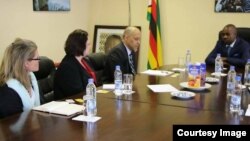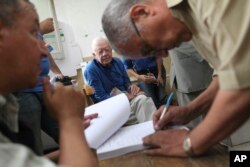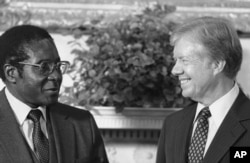MDC Alliance presidential candidate, Nelson Chamisa, on Tuesday met with the Carter Centre pre-election observer team, which is currently in Zimbabwe ahead of the forthcoming general elections set to feature for the first time in 38 years a new presidential candidate representing the ruling Zanu PF party.
In a statement, the MDC-T said Chamisa expressed dissatisfaction over lack of comprehensive electoral reforms, including failure by the government to overhaul the Zimbabwe Electoral Commission that is accused of being aligned to the ruling Zanu PF.
He further questioned President Emmerson Mnangagwa’s recent remarks that Zimbabwe will this year hold a free, fair and credible election.
Mnangagwa, who toppled Mugabe in what the former president calls a coup, will feature in the presidential election instead of Mugabe who ruled Zimbabwe for 37 years.
The opposition has claimed that the elections are always allegedly rigged by the Zimbabwe Electoral Commission in favour of the ruling party.
Zanu PF has dismissed such allegations as baseless and emanating from bitter losers.
Zimbabwe has not yet aligned some laws with the country’s constitution adopted in 2013.
They include the Electoral Act, the Public Order Security Act, Access to Information and Protection of Privacy Act and thousands other laws.
The Cater Center’s application to observe elections in Zimbabwe in 2013 was turned down by then President Robert Mugabe’s government.
Mnangagwa has invited several international organizations to observe the electoral process this year in Zimbabwe’s watershed elections.
The Carter Center, founded by former U.S. president Jimmy Carter, has observed over 94 elections in 37 countries. The Center conducts its election observation work in accordance with the Declaration of Principles for International Election Observation and Code of Conduct for International Observers, which provides guidelines for professional and impartial methods of international election observation.
The Carter Center's election observation missions are international in composition, including expert delegates from a range of countries. The Center assesses the entirety of an electoral process against a country's own legal framework and international commitments to uphold standards for democratic elections.






